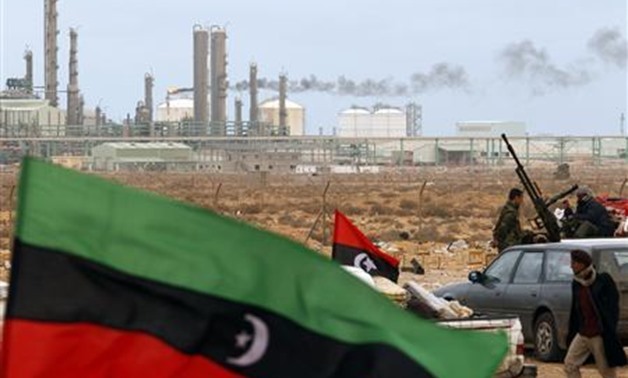
The Kingdom of Libya flag flies in front of a refinery in Ras Lanuf in this March 8, 2011, file photo. REUTERS/Goran Tomasevic
CAIRO - 21 May 2018: The Libyan Popular National Movement issued a statement on Monday, May 21, criticizing what is known as the “Dakar meetings” that took place last week in the Senegalese capital per the Brazzaville Foundation's invitation for the Libyan political parties.
The Popular National Movement said in the statement that the meetings included several terrorist factions known for using violence, affirming that those factions “were one of the direct reasons to destabilize the country during the past years.”
The statement revealed that several radical Islamist political figures, affiliated with the Muslim Brotherhood, attended the meeting and were discussing the country’s future and political situation in an unacceptable way, and that “All of these figures are just using religion again to control the country.”
Furthermore, the statement said that among the factions that attended the Dakar meetings was the Libyan Islamic Fighting Group. “This group used to be the backbone of terrorist organizations in Libya,” the statement stressed.
The Libyan Popular National Movement accused the Libyan Islamic Fighting Group of being responsible for all the violence that took place inside the country during the past years; therefore, the Dakar meetings were refused by several political movements and figures, saying that many of the political parties attending the meetings were not “accepted within the political scene anymore,” unless they issue a formal apology to the government.
The meeting which concluded May 13, called all the Libyan political parties to take part in the coming round of talks, set to take place within the coming 60 days.
Since the ouster of long-time Libyan leader Muammar Ghaddafi more than six years ago, the war-torn country has drawn wide international and regional attention, posing a threat to North African and European national security.
Libya, which is struggling to get through the critical political situation that it has been experiencing since 2011, is not only trying to unify its army, but is also longing to revive its political functions by conducting presidential and legislative elections by mid-2018.
Egypt has hosted several meetings to bring the conflicting factions to the negotiating table, alongside members of Tobruk’s House of Representatives, to resolve the Libyan crisis and amend the Skhirat Agreement, which aims at ending the Libyan civil war.
On May 1, Libyan House of Representatives speaker, Aguila Saleh, said that holding a presidential election in Libya before the end of 2018 is the only solution to solve Libya’s political crisis, especially that it is difficult to reach a real political agreement in Libya soon.
In an interview with a Libyan TV channel, Saleh stressed that he will present the case before Libyan House of Representatives for holding an election to respond to the demands of the Libyan people.


Comments
Leave a Comment